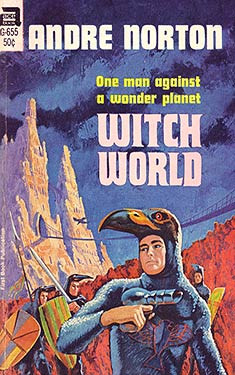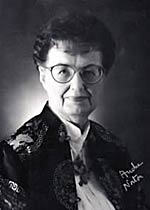WoGF Review: Witch World by Andre Norton
 Sue Bricknell (SueCCCP) is an ex-pat Brit living in Maine. She has no real memory of learning to read and has always had a great love of fantasy. She blames this on her early introduction to the Tales of Beatrix Potter, which she had memorized by the age of four. From an early obsession with Fantasy she has expanded her interests into the Science Fiction, Mystery, Horror and Crime genres. Joining a local book group made her realize that she really likes talking about books, so she began her blog, Coffee, Cookies and Chili Peppers. She has recently had the good fortune to be hired as an assistant librarian, so now she can think about books even more!
Sue Bricknell (SueCCCP) is an ex-pat Brit living in Maine. She has no real memory of learning to read and has always had a great love of fantasy. She blames this on her early introduction to the Tales of Beatrix Potter, which she had memorized by the age of four. From an early obsession with Fantasy she has expanded her interests into the Science Fiction, Mystery, Horror and Crime genres. Joining a local book group made her realize that she really likes talking about books, so she began her blog, Coffee, Cookies and Chili Peppers. She has recently had the good fortune to be hired as an assistant librarian, so now she can think about books even more!
 This is one of those series that I have always meant to read but has somehow never reached the top of my TBR pile. With the incentive of various challenges to encourage me, I finally decided to see if it lived up to its Hugo Award nomination. I am pleased to say that, unlike A Wizard of Earthsea, Witch World seems to deserve its place on all those “Top Fantasy Series” lists out there. It does feel a little dated now, but it is fifty years old, so that is hardly surprising.
This is one of those series that I have always meant to read but has somehow never reached the top of my TBR pile. With the incentive of various challenges to encourage me, I finally decided to see if it lived up to its Hugo Award nomination. I am pleased to say that, unlike A Wizard of Earthsea, Witch World seems to deserve its place on all those “Top Fantasy Series” lists out there. It does feel a little dated now, but it is fifty years old, so that is hardly surprising.
The Witch World itself is lavishly detailed and totally developed. We experience a series of very different cultures and societies, but they are not presented via a mass of exposition. If anything, I would have liked some more detail and perhaps a little longer to immerse myself in each one before we moved on to the next. This was definitely a book that would have benefitted from a good glossary or appendix explaining some of the terms and concepts as it was a little too light on explanations for my taste.
Interestingly, the one area where we had copious detail was one that could have been removed without any reduction in understanding. Ms Norton spends altogether far too much time detailing the history and operation of the Siege Perilous. I felt like this section of the book was almost totally irrelevant and dragged on whilst I was eager to get through the gateway and see the magical world beyond. I know that the idea of the gateways, and those that travel through them, are important to the overall storyline, but I was getting rather impatient with Dr. Petronius and his extended explanation. It was very obvious that Tregarth was a man running out of time, so he would not need much persuasion to try to avoid his pursuers, even if he thought that Petronius was crazy.
The other jarring section of the book was the switch from Tregarth’s POV to that of Loyse. It was great to see a strong female character and I liked her a great deal, but I was left with uneasy feeling that I should have some idea why we were suddenly interested in her. As far as I can tell, she is not mentioned prior to the chapters that follow her so to be suddenly dropped into her head was somewhat unsettling. I felt that this section of the story would have been far more successfully told from the POV of the Witch Jaelithe whom we had previously met and who was obviously a major character.
At this point I must mention one strange choice that Ms. Norton made with respect to the Witches. She tells us that there is a great deal of power in names, a fairly common device when dealing with magic, but does not give the various Witches nicknames, even in Tregarth’s mind. This causes some confusion and uncertainty about the particular Witches involved in certain sections of the book. I find it hard to believe that Tregarth would not assign some sort of identifying tag to each Witch that he encounters, even if he never speaks it out loud. This choice led to very clumsy repeats of his identification of Jaelithe as the woman he had rescued at the start of the novel and giving her some sort of name would have been so much easier. In fact, we only learn her name at the very end of the book when she effectively revokes her status as a Witch by acting on her attraction to our hero.
 This brings us to one aspect of the world that I really did enjoy: the magic. For some reason it is confined to women, thus making them a powerful force in society, which was a very nice change for a society that was basically your typical Medieval European fantasy setting. I also liked the way that the magic was mind-based and more to do with mental discipline and good luck than anything else. This fallibility was also a nice deviation from the usual whizz, bang, point and shoot type of magic that we see so often. It also meant that the Witches had to work together with their male army in order to really accomplish anything, showing a fairly equal society in many aspects. This equality was even highlighted by the disapproval that they felt for the Falconers’ society, which was male-dominated and used their women as breeding machines.
This brings us to one aspect of the world that I really did enjoy: the magic. For some reason it is confined to women, thus making them a powerful force in society, which was a very nice change for a society that was basically your typical Medieval European fantasy setting. I also liked the way that the magic was mind-based and more to do with mental discipline and good luck than anything else. This fallibility was also a nice deviation from the usual whizz, bang, point and shoot type of magic that we see so often. It also meant that the Witches had to work together with their male army in order to really accomplish anything, showing a fairly equal society in many aspects. This equality was even highlighted by the disapproval that they felt for the Falconers’ society, which was male-dominated and used their women as breeding machines.
The plot rips along at a fast pace, almost too fast at times, and covers a lot of ground. We see a lot of the continent and meet a fairly impressive array of characters in a short space of time, which unfortunately leads to them having little depth. Even our lead characters are fairly two-dimensional and do not show any real growth. This is disappointing and means that I do not feel a massive desire to return to the world and find out what they do next. The overall story is fairly predictable, but I am not sure if this is because so many titles have reworked it in the subsequent decades. There are some wonderful touches, such as the Falconers’ ability to communicate through their birds, which I would like to explore in more detail, but I do not feel much urgency to return to this world.



















 Full Details
Full Details


No comments yet.
Sorry, the comment form is closed at this time.